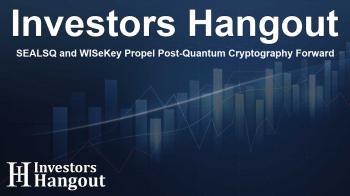SEALSQ and WISeKey Propel Post-Quantum Cryptography Forward

Post-Quantum Cryptography: A Growing Necessity for Digital Security
As the technology landscape continues to evolve, the need for robust security measures becomes increasingly urgent. Companies like SEALSQ Corp (NASDAQ: LAES) and its parent organization, WISeKey International Holding Ltd, are stepping up to lead the charge in the post-quantum cryptography (PQC) space. Their focus is on providing solutions that not only protect digital assets today but also lay the groundwork for a secure future against looming quantum threats.
The Threat of Quantum Computing
The rise of quantum computing heralds a significant shift in how we approach digital security. While experts suggest that practical applications of quantum computing may still be on the horizon, the risk to traditional cryptographic systems is an immediate reality. SEALSQ's leadership in the PQC sector is a proactive response to this risk, targeting advanced quantum-resistant solutions designed to defend against current and future cyber threats.
Innovative Solutions by SEALSQ
SEALSQ has carved a niche as a pioneer in developing quantum-resistant algorithms, particularly aimed at embedded devices and microcontrollers. Their flagship algorithm, CRYSTALS-Kyber, is gaining recognition globally as a top-tier solution for securing IoT ecosystems and vital infrastructures against the vulnerabilities posed by quantum computing.
WISeKey’s Role in Cybersecurity
In tandem with SEALSQ, WISeKey is making significant strides in integrating post-quantum capabilities into its diverse cybersecurity offerings. Their strategies include enhancing their Root of Trust and PKI (Public Key Infrastructure) solutions to ensure companies and government entities can transition smoothly to quantum-safe environments.
Urgency and Industry Standards
Given the potential threats posed by quantum advancements, organizations are motivated to adopt PQC now, rather than wait until quantum computers become fully operational. Recent developments have established concrete timelines for the implementation of PQC across various sectors. For example, the National Institute of Standards and Technology (NIST) is expected to finalize its first PQC standards soon. Meanwhile, organizations like the US CISA have laid out roadmaps urging early adoption into the late 2020s, while the White House anticipates a full federal transition to quantum-safe cryptography by 2035.
Global Implications
The global push for PQC solutions is reflected in the efforts of governments and international organizations. NIST's commitment to finalizing quantum-resistant algorithms underscores the critical nature of these advancements. Both SEALSQ and WISeKey are aligning their technologies with these established standards to reinforce global cybersecurity protocols.
Market Growth Ahead
The market for post-quantum cryptography solutions is on a projected growth trajectory, even before quantum computing reaches its full potential. Unlike quantum computing firms focusing on niche applications, PQC providers are ready to deliver effective, scale-able solutions for immediate deployment on existing infrastructures. This unique positioning ensures that SEALSQ and WISeKey can effectively address the pressing needs of enterprises and governments while fostering long-term advancements in quantum technology.
Leading the PQC Revolution
With the digital landscape constantly changing, SEALSQ and WISeKey remain frontrunners in the PQC arena, committed to making critical systems resilient and future-proof. Their collaborative discussions and efforts will be highlighted at the upcoming SEALSQ WISeKey PQC AI event.
About SEALSQ
SEALSQ specializes in creating integrated solutions built on a foundation of semiconductors, PKI, and post-quantum technology. Their commitment to developing innovative hardware and software products aims to address a diverse range of applications—from smart home devices and healthcare solutions to automotive technologies and industrial control systems.
Understanding Post-Quantum Cryptography
At its core, post-quantum cryptography refers to cryptographic approaches resilient against attacks from quantum computers. As quantum technology evolves, it threatens to compromise many traditional cryptographic standards, including RSA and Elliptic Curve Cryptography (ECC). Through PQC, the intention is to develop next-generation cryptographic methods capable of withstanding quantum assaults, thereby protecting sensitive information.
Frequently Asked Questions
What is post-quantum cryptography?
Post-quantum cryptography (PQC) refers to cryptographic methods designed to secure data against potential quantum computer attacks.
What companies are leading in post-quantum cryptography?
Companies like SEALSQ Corp and WISeKey International Holding Ltd are leading the charge in the development and implementation of PQC solutions.
When should organizations adopt PQC solutions?
Organizations are encouraged to adopt PQC solutions immediately to secure their data ahead of the anticipated advancements in quantum computing.
What are the benefits of PQC?
PQC aims to safeguard sensitive information, ensuring data protection against the emerging threats posed by quantum computing.
How is the market for PQC expected to grow?
The market for PQC solutions is expected to experience significant growth as organizations recognize the urgent need for enhanced cybersecurity measures.
About Investors Hangout
Investors Hangout is a leading online stock forum for financial discussion and learning, offering a wide range of free tools and resources. It draws in traders of all levels, who exchange market knowledge, investigate trading tactics, and keep an eye on industry developments in real time. Featuring financial articles, stock message boards, quotes, charts, company profiles, and live news updates. Through cooperative learning and a wealth of informational resources, it helps users from novices creating their first portfolios to experts honing their techniques. Join Investors Hangout today: https://investorshangout.com/
Disclaimer: The content of this article is solely for general informational purposes only; it does not represent legal, financial, or investment advice. Investors Hangout does not offer financial advice; the author is not a licensed financial advisor. Consult a qualified advisor before making any financial or investment decisions based on this article. The author's interpretation of publicly available data shapes the opinions presented here; as a result, they should not be taken as advice to purchase, sell, or hold any securities mentioned or any other investments. The author does not guarantee the accuracy, completeness, or timeliness of any material, providing it "as is." Information and market conditions may change; past performance is not indicative of future outcomes. If any of the material offered here is inaccurate, please contact us for corrections.
